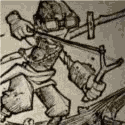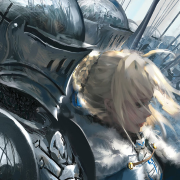|
With some players, you absolutely can't be subtle about signposting "this is too hard for you at the moment". Or even do things as obvious as a describing a literal signpost with the Cleric-General's warning "hazardous area, PC level X and above or death will result". You have to say "out of character, not kidding around, your dudes will all die if they go in there" and even that only works about half the time. Eventually you realise that they're gonna charge in regardless, so you build your scenarios around that.
|
|
|
|

|
| # ? May 18, 2024 06:40 |
|
Yeah, don't be shy about breaking character. When you're signposting a TPK-level threat, don't get cute about it, because- well, just get a look at your favorite bit of pulpy heroic fiction and see how many times they build up a threat to the main characters as being totally undefeatable right before the heroes do just that. Sticking IC signposts is a great way to encourage the PCs to engage with the threat, because it says 'This thing is interesting and you'll be cool when you beat it.'
|
|
|
|
kaffo posted:I mean if I heard that description at any level I'd like like Exactly this. There is no shame in stepping back and saying "Guys, I'm going to talk out-of-game for a second. This is a really dangerous area for you to be in. You might want to reconsider." It's entirely possible that your players are thinking something like "Whatever's down here is probably pretty badass but there's no way our friendly GM would be cruel enough to just let us wander into a TPK by having a monster that's like ten levels too high for us just chilling down here, it's probably just cool SFX stuff."
|
|
|
|
As a general rule: When you show the PCs an apocalyptic evil being of pure destruction and doom, don't be surprised when they want to sword fight it. Also: Players tend to move towards the most interesting thing. Playing up an over-hard threat up by describing it in vivid detail will have the opposite effect to what you want it to. Elector_Nerdlingen fucked around with this message at 13:08 on Oct 17, 2017 |
|
|
|
Probably no surprise I'm on board with DivineCoffeeBinge, Ratoslov, AlphaDog, and kaffo. However! I do think you can let them explore a little more and have a fun bit of narrative for it. Do it At the Mountains of Madness style. Let them keep going a bit further, and increasingly throw in signs that This Is Bad Idea. But when you spring the beholder, have it be a narrative cut scene. Set up a situation where they see the beholder before it knows the party is there, and they have a clear path of escape. Maybe have it murdering a monster that the party recently had a difficult fight with. Just wiping the floor with monsters the party finds troublesome. Then step out of character and say "Just so we're clear, if you keep going in this direction, you're going to run into things that will absolutely kill you dead. You really want to go somewhere else." From there, use that as a springboard to get them somewhere they can handle but is also interesting. If the party is the kind that's game for it, you can even have it be an escape scene, where they run from the beholder and manage to lose it in the nick of time. You still get an encounter out of it, just be clear its not a normal combat encounter. In doing so, they now find themselves in <insert cool adventure location here>. Depending on the group, you might even want to explain the whole plan ahead of time. There are times where you just have to step in as GM and put a stop on. This should be when there's been an obvious miscommunication, and/or when the outcome a decision is clearly not going to be enjoyable or interesting to you and/or the players. Everybody dying to beholders is likely in that latter category. Though not always of course - I can easily imagine a game where everybody dying horribly due to a bad decision is part of the fun. Just doesn't sound like yours is one. The risk is that players can feel like their choices don't matter, which is also frustrating. Players want to have agency. This is why thinking through "okay, can I continue the narrative a little further to validate their choice, and set up a new set of alternative choices to consider" is worthwhile. At that point your OOC communication isn't a hard stop, it's a redirection. In the above example, don't be afraid to explicitly tell them their next choice does have meaning. "You have a couple choices on how to evade the beholder, and more will come up during that scene, and that will determine where you end up." If you can, use information they've gathered in earlier dungeon crawling to suggest the consequences of various choices. Maybe a certain kind of stone arrangement is used by duergar scouts to mark safe passages - that means the route won't dump them into a pit, but they might run into another foe. Maybe they catch the distinctive smell of the fungus forest from a particular tunnel. Try to telegraph three or four possible routes - one of them can be "you just don't know" - for the players to weigh the pros and cons of. What you ideally want to have at the end is the players feeling awesome for managing to escape the beholders. "We should have been dead, but because of our skill and courage, we made it out alive." Make it a win for them. Comrade Gorbash fucked around with this message at 14:18 on Oct 17, 2017 |
|
|
|
Comrade Gorbash posted:However! I do think you can let them explore a little more and have a fun bit of narrative for it. Do it At the Mountains of Madness style. Let them keep going a bit further, and increasingly throw in signs that This Is Bad Idea. But when you spring the beholder, have it be a narrative cut scene. Set up a situation where they see the beholder before it knows the party is there, and they have a clear path of escape. Maybe have it murdering a monster that the party recently had a difficult fight with. Just wiping the floor with monsters the party finds troublesome. This is what I was going to suggest: turn it into a horror scene, a run-the-hell-away-holy-poo poo thing. The other suggestion I have is that maybe you let them kill the beholder. When they find it, they find it having just killed something even worse and weakened. If your players are the kind to find a run-for-your-life encounter unsatisfying, there are ways to turn it into a just-barely-survive-fighting-a-weakened-monster encounter instead. I've done a similar setup before, though it was intentional from the start. Ultimately it might not end up getting the message of "hey you guys just ignored all my signposting and walked into a situation you can't handle" across, but if it ends up being a cool adventure that's a good outcome, too.
|
|
|
|
Harrow posted:Ultimately it might not end up getting the message of "hey you guys just ignored all my signposting and walked into a situation you can't handle" across, but if it ends up being a cool adventure that's a good outcome, too.
|
|
|
|
Yeah...I find that once swords come out, PCs are loathe to actually run away. There's this perverse thing in RPGs where players get into the "win or die trying" mentality, then get salty when that mentality leads to their characters actually dying. Many players need to be trained out of this behavior, frankly. Back when I was running a long-running Shadowrun game, it took literally years for some people to get that combat was generally a dangerous place best avoided. And it's not like my sign-posting was at all subtle; "Dude, your proposed action is tantamount to suicide." Oh, hey, look at that, you died. Shocking. "Yeah, but my next character is going to be even more of a combat-monster bad-rear end!" Also, very few games model PC fear well. It is simply assumed that PCs are the masters of their own will, and it is certainly true that player agency must be preserved. But I also think there's room for things that are and should be terrifying to the PCs having an effect. The PbtA games actually have a pretty good way to implement this - when a monster/foe/whatever is stupidly terrifying, you are acting under fire/pressure/defying danger to do anything other than piss yourself and run. This makes it explicitly clear that "piss myself and run" is an option, and once you start doling out consequences for missed or partial'd rolls, it's an option that starts to look pretty attractive pretty quickly.
|
|
|
Ilor posted:Yeah...I find that once swords come out, PCs are loathe to actually run away. There's this perverse thing in RPGs where players get into the "win or die trying" mentality, then get salty when that mentality leads to their characters actually dying. Many players need to be trained out of this behavior, frankly. Back when I was running a long-running Shadowrun game, it took literally years for some people to get that combat was generally a dangerous place best avoided. And it's not like my sign-posting was at all subtle; "Dude, your proposed action is tantamount to suicide." Oh, hey, look at that, you died. Shocking. I hate to sound like a grognard, but I think video games probably have some blame in reinforcing this kinda mentality. It's insanely rare to find a game where any combat situation is truly unwinnable, and you usually get to try again right away when you do lose. Even if you know the stakes are higher in a tabletop setting where death is quasi-permanent, it can be hard to shake the mentality that any enemy can be conquered with enough skill.
|
|
|
|
|
Lurdiak posted:I hate to sound like a grognard, but I think video games probably have some blame in reinforcing this kinda mentality. It's insanely rare to find a game where any combat situation is truly unwinnable, and you usually get to try again right away when you do lose. Even if you know the stakes are higher in a tabletop setting where death is quasi-permanent, it can be hard to shake the mentality that any enemy can be conquered with enough skill. Honestly I was trying not to blame the kids today and their vidya games in my earlier post, but damned if I wasn't thinking it. I don't even think it's a matter of the "no fight is unwinnable" mindset, honestly; I would rather suspect that the players are, on some level, thinking something along the lines of "look, we're only a level 4 party, so clearly none of the monsters in this zone should be more than level 6 or so, right?" Maybe that's cynical of me, but I've seen too many players look shocked that they actually could wander into an encounter far beyond their power level.
|
|
|
|
I think the other other takeaway from vidya games is that if you CONsidered a mob in EverQuest and it was red, or if you clicked on a WoW mob and the icon was a skull, you absolutely knew that that poo poo was not to be messed with.
|
|
|
|
gradenko_2000 posted:I think the other other takeaway from vidya games is that if you CONsidered a mob in EverQuest and it was red, or if you clicked on a WoW mob and the icon was a skull, you absolutely knew that that poo poo was not to be messed with. Didn't stop me from trying at least once.
|
|
|
|
I think blaming video games is too short-sighted. How many pieces of media can you say really have a scene that goes: "the threat is overwhelming, so our heroes wisely hosed off for the night?" Even in stories that have the heroes run from something, it at least usually starts with them sticking their dick where it shouldn't go first, then bailing when things go south. Unless you're playing a game that is explicitly about avoiding combat (like a horror game), I think most people are going to gravitate towards narratives that are about direct confrontation, because those are the stories we've been telling each other throughout almost all of history, regardless of culture aside from some outliers.
|
|
|
|
Keeshhound posted:I think blaming video games is too short-sighted. How many pieces of media can you say really have a scene that goes: "the threat is overwhelming, so our heroes wisely hosed off for the night?" Even in stories that have the heroes run from something, it at least usually starts with them sticking their dick where it shouldn't go first, then bailing when things go south. Agreed heavily. I guess that's one thing that's rather odd about the Lord of the Rings, given that most of the actual fighting is done by proper armies, whereas the plot work is mostly running away, subterfuge, and infiltration.
|
|
|
|
In fairness, if most published fiction doesn't have scenes where the heroes, realising a threat is out of their league, gently caress off and try something easier, that should be telling you something about the narrative merit of that particular scenario. A much better scenario is "the heroes find themselves unexpectedly out of their depth and flee for their lives", but if you've dropped a whole boatload of warnings then the players can't enter that scenario -- so all those big warning signs will actually be counter productive. You're much better off having the beholder leap out and surprise them in an entirely unremarkable stretch of dungeon and gib an NPC with a single shot if you want the players to run away from it.
|
|
|
|
Am I the only one thinking you should just make it be some other boss monster that is level appropriate and save the beholder for later? I don't understand why it's so crucial that you have them be way out of their league in this cool place they clearly want to explore. Make the cavern be an abandoned beholder lair that your level 1 bad guys are camping out in, and make what was supposed to be the level 1 bad guys' fortress a beholder zoo that the beholders escaped from.
|
|
|
|
Mechanically, in a lot of games running away isn't really an option. For example, in D&D 3.x, usually monster movement rates dramatically out-scales PC movement rates unless you're building your character for movement speed or are (of course) a spellcaster. For games with facing, facing away from an enemy can make it easier for you to get hit. etc. etc. If you want PCs to run away, it might be a good idea to make a 'Flee For Your Life!' mechanic to make it something that can actually be achieved. Also, having it in the list of actions next to stuff like 'charge' and 'grapple' is liable to make players think of it as a tactical option.
|
|
|
|
DivineCoffeeBinge posted:Maybe that's cynical of me, but I've seen too many players look shocked that they actually could wander into an encounter far beyond their power level. Not to focus on you specifically but I'm noticing a lack of acknowledgement that dangerous encounters in tabletop RPGs do not just appear out of nowhere. The GM has to put them there. Going back to the original question, if you're afraid that low-level PCs will get murdered by a beholder and it's gonna gently caress up your game, don't put the beholder there. You, the GM, are running the show. If you decide to put some heavy poo poo in front of the PCs, you have to accept the fact that they might charge into it. If you don't want them to, don't put it there.
|
|
|
|
Lynx Winters posted:Not to focus on you specifically but I'm noticing a lack of acknowledgement that dangerous encounters in tabletop RPGs do not just appear out of nowhere. The GM has to put them there. Going back to the original question, if you're afraid that low-level PCs will get murdered by a beholder and it's gonna gently caress up your game, don't put the beholder there. You, the GM, are running the show. If you decide to put some heavy poo poo in front of the PCs, you have to accept the fact that they might charge into it. If you don't want them to, don't put it there. I agree with this 100% as well, but as the guy asking the question had already put the beholder there I think everyone was just sort of operating under the assumption that that was gonna be a thing so what do we do moving forward.
|
|
|
|
Unless the PCs have actually seen it, it's not real yet.
|
|
|
|
Or have a reason that the Beholder doesn't murder the PCs and end the campaign when they charge it and get chumped. It's not difficult to come up with a reason that a Beholder living under a city might have a use for a group of human minions.
|
|
|
|
The beholder is actually the final project of a student at illusionist university.
|
|
|
|
Anyone ran or played in a West Marches style campaign and have advice?
|
|
|
|
Or, hell, maybe the Beholder goes out sometimes. Let the PC’s steal some poo poo and run away, and then make an enemy of the Beholder for a while until you have a big boss battle later.
|
|
|
|
VanSandman posted:Or, hell, maybe the Beholder goes out sometimes. Let the PC’s steal some poo poo and run away, and then make an enemy of the Beholder for a while until you have a big boss battle later. Out doing some Beholder groceries All the advice above is perfectly valid, it just depends how OP wants to navigate this and what his party will enjoy
|
|
|
|
sc4rs posted:Am I the only one thinking you should just make it be some other boss monster that is level appropriate and save the beholder for later? But a lot depends on the verisimilitude and narrative flexibility of each GM's world. The OP mentioned giving lots of clues and "Beholder sign," which (presumably) the PCs were supposed to recognize. If the baddie is then NOT a Beholder, that breaks the immersion, which in turn weakens future attempts at foreshadowing. That said, you need to be careful with foreshadowing. Not every player has encyclopedic knowledge of the setting's monsters, so "signs" that may be obvious to you may be inscrutable nonsense to your players. They may literally have no idea that what they are about to encounter is something they can't handle. Sure, they come across corpses - but those guys were 0-level chumps, we're adventurers! I get wanting to stay true to your foreshadowing, especially if the setting or system you're using doesn't allow for much narrative flexibility (i.e. you discover that the "beholder" is actually the product a mewling gnome illusionist - damned, dirty gnomes! - and the "corpses" were stolen from the local charnel house and artfully arranged to convey danger). But beware the cost. Also, FWIW, I try to limit the "no seriously, this will kill you" stuff to obvious things as a way to encourage creative solutions. It is obvious to everyone that you cannot fight your way into the royal chambers, as the King's Guard are universally regarded as death-dealing bad-asses to a man. But you still need to abduct the Crown Prince, so you're going to have to figure out a different way to get in - and back out! It takes the "obvious" solution (Haha! We'll fight our way through! Where did I put my initiative die?") off the table from the outset, and instead encourages the players to work together to come up with a clever way to overcome the challenge.
|
|
|
|
Lynx Winters posted:Not to focus on you specifically but I'm noticing a lack of acknowledgement that dangerous encounters in tabletop RPGs do not just appear out of nowhere. The GM has to put them there. Going back to the original question, if you're afraid that low-level PCs will get murdered by a beholder and it's gonna gently caress up your game, don't put the beholder there. You, the GM, are running the show. If you decide to put some heavy poo poo in front of the PCs, you have to accept the fact that they might charge into it. If you don't want them to, don't put it there. That being said, we all make this kind of mistake as a GM at times. Of putting in something dangerous in order to set up a cool set piece and then having the players engage with it in a way we didn't expect, and would basically end the game if followed through on. As a GM, we should always be willing to admit when we made a mistake, but there are ways to navigate back out of a mistake that lead to more good things in game, as opposed to just ret-conning the whole thing. Ret-conning is a useful tool but it's a very blunt one, and looking for more elegant outs is a good idea. Keeshhound posted:I think blaming video games is too short-sighted. How many pieces of media can you say really have a scene that goes: "the threat is overwhelming, so our heroes wisely hosed off for the night?" Even in stories that have the heroes run from something, it at least usually starts with them sticking their dick where it shouldn't go first, then bailing when things go south. As a general rule, any take that attributes some aspect of player behavior to video games is a bad take.
|
|
|
|
kazr posted:Anyone ran or played in a West Marches style campaign and have advice? I've run in two, and am currently helping co-DM another one. What advice in particular? Are you running one? Playing in one?
|
|
|
|
Spiteski posted:I've run in two, and am currently helping co-DM another one. What advice in particular? Are you running one? Playing in one? I'm looking to slowly work on the framework of one while I finish up my current campaign. I want to know what worked for you, what didn't, and how it could have been better and anything else you'd think would be worth knowing. What I'm making's main shtick is a mega dungeon under town, ala Torchlight that serves as an end goal. The big bad is influencing (cataclysmic) events and the players have to explore the wilderness, fortify town, make allies, and gain power to delve deeper in the dungeon to defeat the big bad. The main point is to have more of an overarching narrative instead of a bunch of barely connected if not at all one offs. kazr fucked around with this message at 19:29 on Oct 17, 2017 |
|
|
|
I'm having a bit of a debate with myself about an upcoming game I'm supposed to run. My group wants to play Starfinder specifically, and I've been jonesing to run both it and something PbtA. I'd like to do PbtA but I don't have time to really learn Uncharted Worlds, and already have knowledge of Starfinder, so I think I'm going to run it with Starfinder and play in the spirit of a PbtA game - play to find out what happens. There's a particular part of the Starfinder setting that I'm interested in exploring though, the Halls of the Living. On the radioactive world of Eox, which is run by powerful and ancient necromancers, there's a subterranean city designed specifically for living creatures. From there are broadcast cruel reality shows and competitions which are viewed around the Pact Worlds - the primary worlds of the setting. My idea is to have the game start out in media res during the broadcast of one of these events, with the group having the spotlight. I was thinking about some kind of dungeon crawl, but I don't want it to be too large, since I've had games stall out in long dungeons before (namely Thistletop from Rise of the Runelords, which is fairly long and covers about two levels). That's also when we'd actually figure out why there were there and what's motivating them, and then they can figure out where they want to go if they get out. I kind of want to figure out why they were traveling together before starting the game, but I'm not sure. I know I would like to include Bonds as a thing, and use some kind of reward system to incentivize roleplaying and resolving bonds. I'm just not sure if this is too ambitious, and the idea of starting off potentially captive is generally a red flag. I'm a relatively inexperienced DM, too. I've run a bit of Curse of Strahd, a bit of Rise of the Runelords (which fell apart from the previously mentioned pacing, and real life schedules), and a bit of Iron Gods (which also fell apart due to real life) - this would be my first real attempt to just play something I created, while also creating it with the players. I feel like I may be over thinking things... 
|
|
|
|
I suspect it'd be less work to learn Uncharted Worlds than modify Starfinder to do what you want. Especially given the additional session prep overhead Starfinder has. But the only part there that's a significant issue is it sort of sounds like you haven't run the campaign concept past the players. It sounds cool, but it's also an idea that really needs everyone to be on board ahead of time. Given the amount of effort character creation requires in Starfinder, it's probably worth having a session 0 for that and for pitching the campaign concept.
|
|
|
|
Once again I agree with Gorbash It sounds to me like you want to run uncharted but you're feeling under pressure to run the other system You can rattle through the uncharted book in as little as a few hours if you get your head down, which obviously won't be a solid comprehension but will be enough to get going Or ask players to wait one week so you can catch up and feel more conformable I dunno what you are your group are like, but personally I found PbtA systems pretty liberating in terms of what I can do as a player and as a GM, so hopefully you'll find the same thing if you run it All in all though, I've not actually played with either system, so please take my advice with a pinch of salt. Especially if another goon here has experience in either or both
|
|
|
|
kaffo posted:Once again I agree with Gorbash They're pretty into Starfinder specifically because they're nuts about Pathfinder, I'm the one who wants to move away from that. I'm just nervous that a full PbtA game won't be crunchy enough for them
|
|
|
|
The Changeling posted:They're pretty into Starfinder specifically because they're nuts about Pathfinder, I'm the one who wants to move away from that. I'm just nervous that a full PbtA game won't be crunchy enough for them EDIT: The Changeling posted:...they're nuts about Pathfinder... Ilor fucked around with this message at 21:57 on Oct 17, 2017 |
|
|
|
Honestly, I think the bigger concern is making sure the players are cool with the campaign idea.
|
|
|
|
I would say it's about 50/50 making sure they're okay with the system and with the campaign idea. You should have buy-in on pretty much the whole concept.
|
|
|
|
Maybe split the difference and run it in a system a) is good but b) is still primarily about tactical combat?
|
|
|
|
Tuxedo Catfish posted:Maybe split the difference and run it in a system a) is good but b) is still primarily about tactical combat? That's doable, I'll talk to them about Strike! instead. I was kind of baked when I came up with the idea and really excited, I had to write it down and make sure I was thinking through every part of it. Ilor posted:Jesus, WTF is wrong with people? Yeah, I.. 
|
|
|
sc4rs posted:Am I the only one thinking you should just make it be some other boss monster that is level appropriate and save the beholder for later? I don't understand why it's so crucial that you have them be way out of their league in this cool place they clearly want to explore. Make the cavern be an abandoned beholder lair that your level 1 bad guys are camping out in, and make what was supposed to be the level 1 bad guys' fortress a beholder zoo that the beholders escaped from. Make the beholder really stupidly old, absolutely certain that it is unbeatable, and incredibly bored because of it, have it give them a good but non-fatal thrashing, and it doesn't pursue in hopes that they'll come back someday and be an actual challenge. Basically Saitama, is what I'm saying. Just play up the fact that it is just completely bored and not even really paying attention to them as it kicks their asses.
|
|
|
|
|

|
| # ? May 18, 2024 06:40 |
|
Or before considering which specific idea to use: if there aren't interesting consequences for entering areas out of your characters' depth, you probably just shouldn't make areas out of your characters' depth accessible in the first place. So what consequences do you and your group find interesting?
|
|
|





































